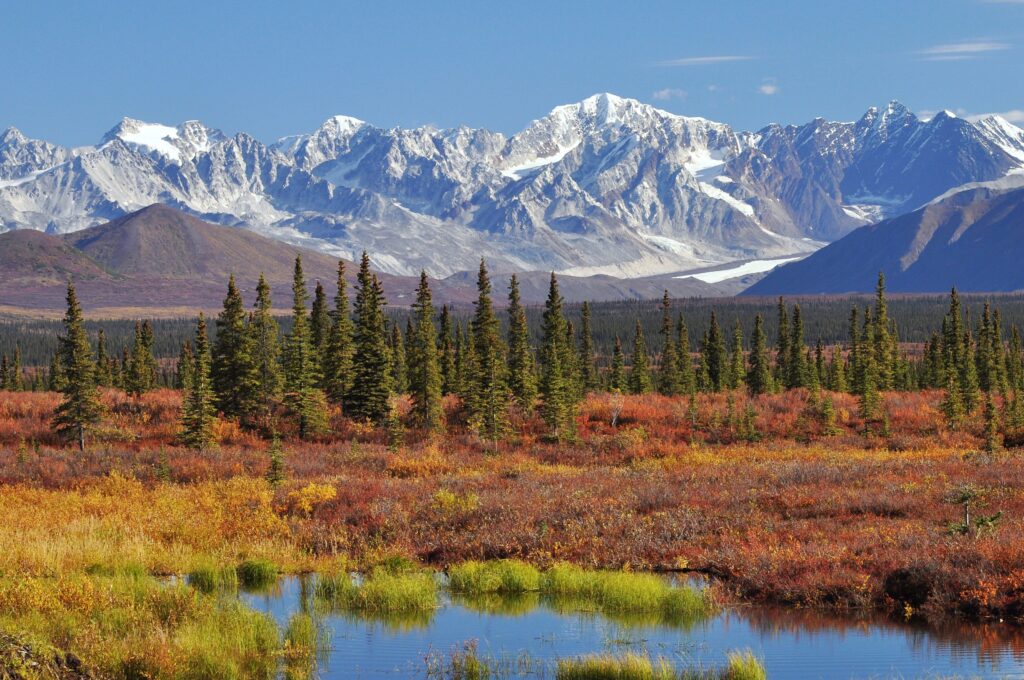
Inupiat values are a lot different than western culture when it comes to the land. The Inupiat people believe they aren’t the owners of the land the land owns itself. They believe in preserving the land, respecting it and using the resources of the land in moderation. The Picture of above shows raw land without any buildings or unnecessary man-made things to disrupt nature. Knowing the Traditional Inupiat values and practices in regard to the land and how Indigenous people only take what they need from the land while others hunt for sport, fun and so on, it makes me wonder if the fish and game laws are more so to govern people that aren’t indigenous and who don’t follow these same values and practices. If that is the case it makes it unfair and injustice for Indigenous people to have to follow these guidelines on their own land. I believe other cultures including my own could learn a lot from indigenous people’s in general and I think the way we learn is by being willing to learn and willing to ask for permission to utilizes what was learned. Respect the land, take care of the land, take only what you need from the land and don’t over build on the land.
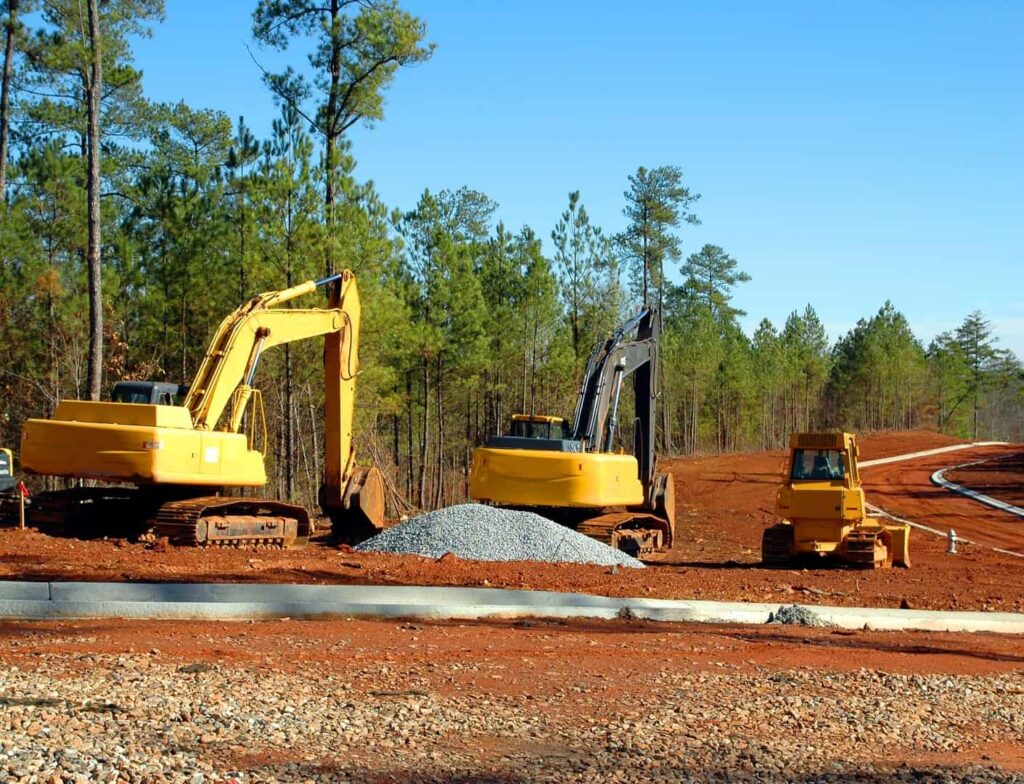
When I think of Western Culture and the way we view the land and treat the land the first thing that comes to mind is ownership. The complete opposite of the Inupiat people’s. In Western Culture the more land you own the more you’re celebrated. The more land you own the more you can build on it. The picture above shows resources being destroyed to create likely a house that is big enough to house 3 families but in actuality it’s being built for one family. Or a golf course that required hundreds of trees to be cut down and hundreds of animals to relocate all to enjoy some golf. Today we don’t view the wage of those trees close to the importance of our hobby or sport but we can’t say it won’t affect our grand kids, kids. American was founded on the premises of conquer and we still operate under those same guidelines today. If we were willing to take a page out of the Inupiat people’s book and treat the land with respect and dignity, I’m sure with a collective effort this could impact and preserve our planet for thousands of years.
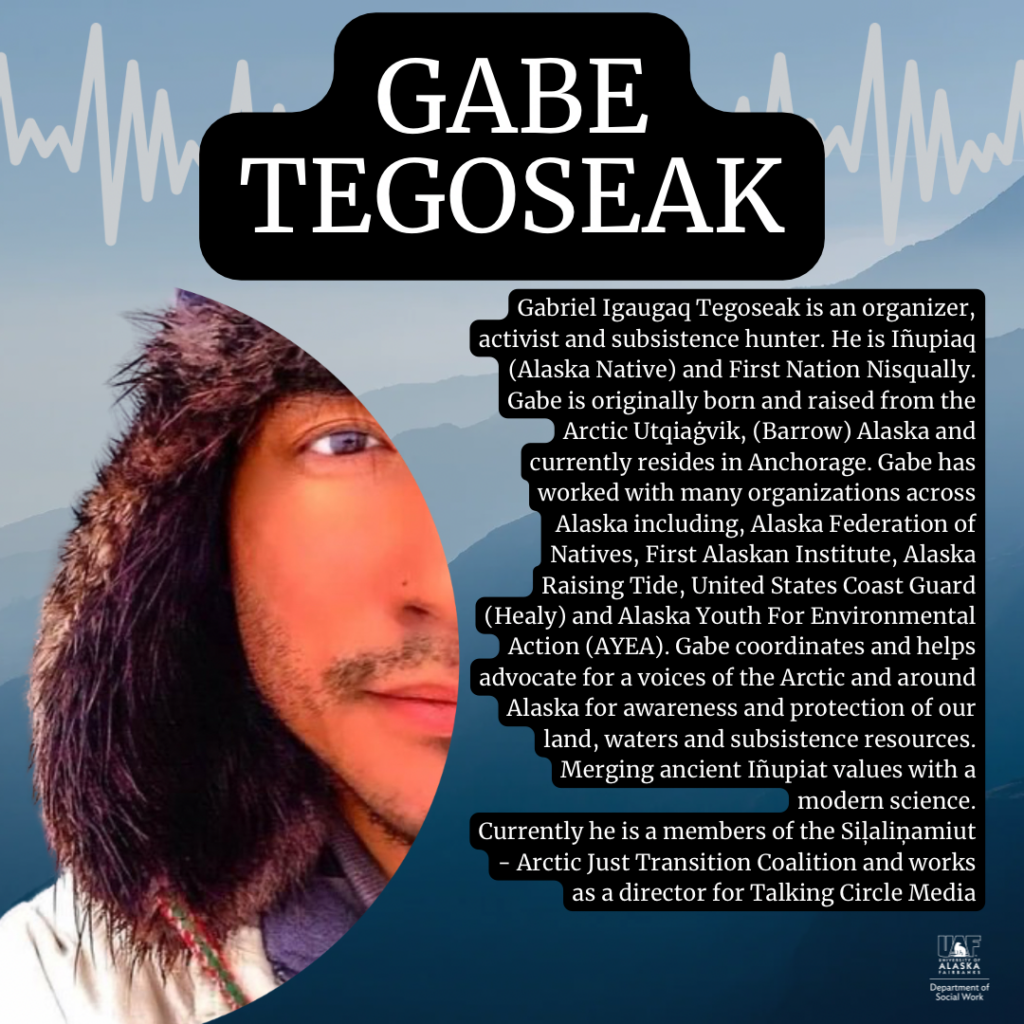
I was able to “call in” and speak to Gabe about different experiences we both shared in different situations in our life’s. I often ask myself am I imagining things or do others experience these things as well. It was relieving to hear his stories and to find reassurance that I wasn’t the only one. I also listened to Gabe speak about his respect, care and connection to the land and as always it encouraged me to continue to find a relationship with the land. I’ve been in Alaska for 14 years and had never been sledding. Welp I found myself out sledding. Now I guess I could argue it had nothing to do with me trying to connect myself to the land but I think that wouldn’t be true. After hearing the importance of this connection I’ve intentionally tried to get out more in nature with little technology as possible. I can honestly say after spend a hour or so out on the campus sledding I felt good, I felt a connection, my family was happy. This isn’t a feeling we feel when we watch a movie together or eat dinner or play a video game. This feeling of connections was a connection together, thru nature.
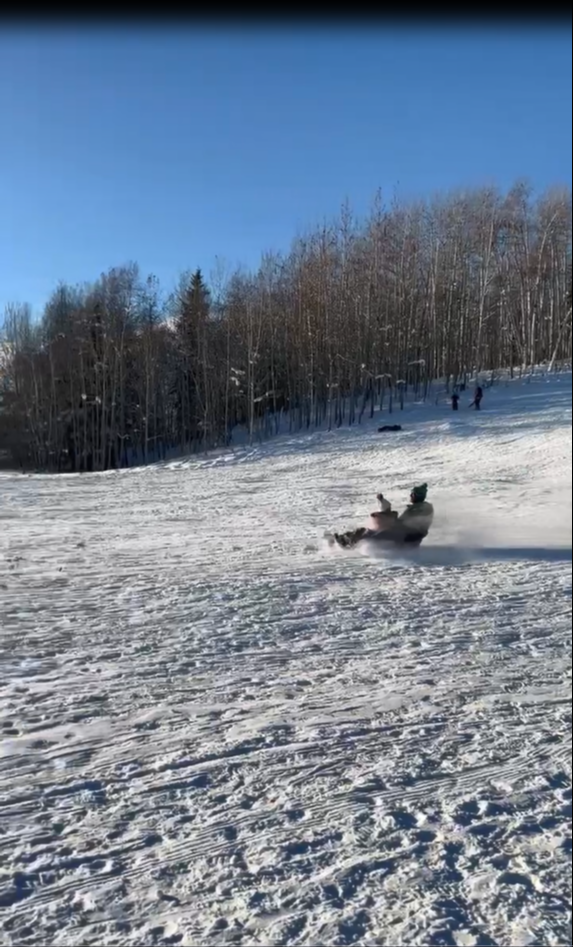
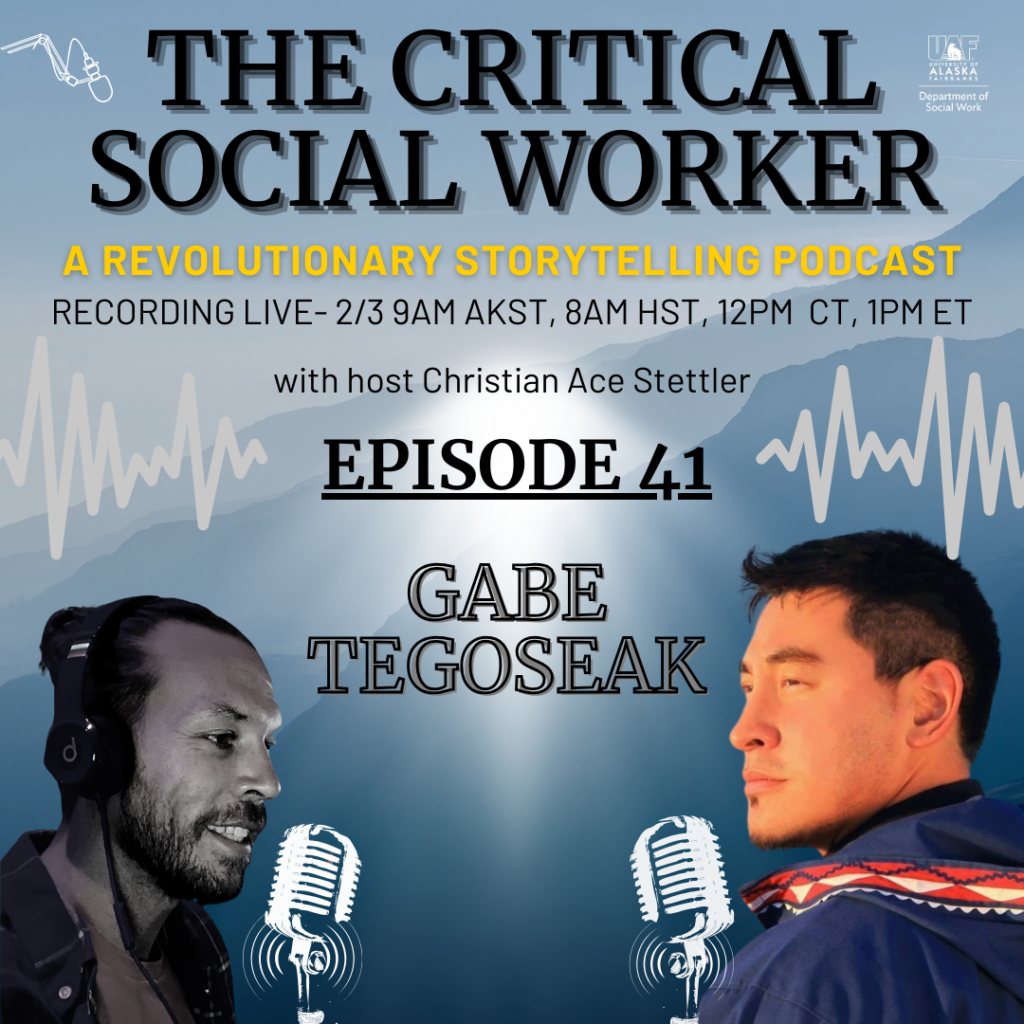
As we all know the Critical Social Worker Podcast is a Revolutionary Storytelling Podcast founded and hosted majority of the time by Professor Ace. I have had the opportunity to be a guest on the podcast and have also had the opportunity to “call in” and speak to some guest that seem to never disappointment with their insight and knowledge base. The interesting thing about this podcast is we get a lot of prospectives from different viewpoints. It allows me to get a sense of understanding of how other people view and navigate thru didn’t challenges that we often face. For anyone interested in viewing this podcast or others previous podcast check out the video below and YouTube will suggest more!
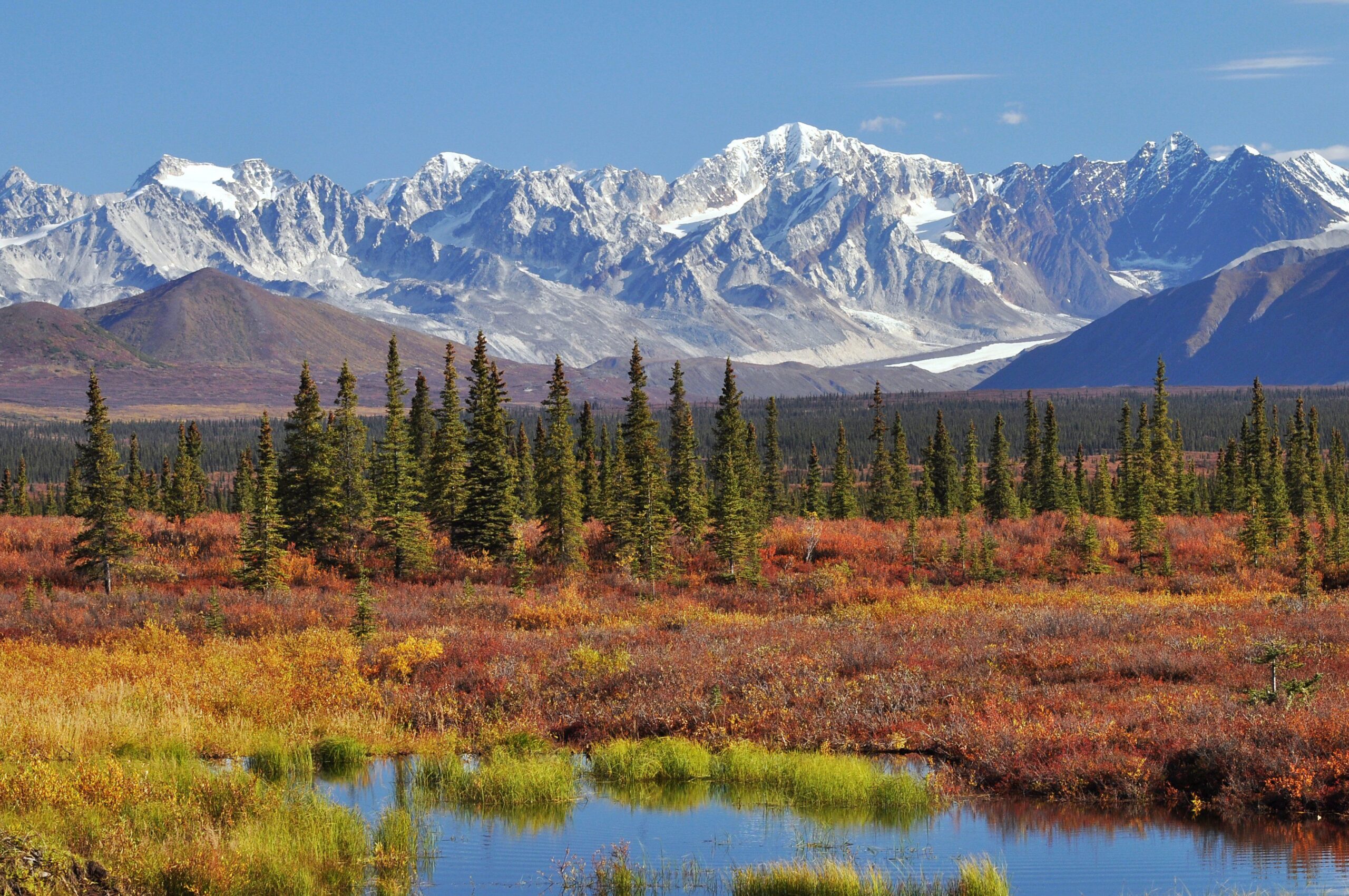
Comments
2 responses to “Learning the land from one another”
The comparison between the Inupiat perspective on land and Western culture’s approach is a thoughtful and interesting comparison. The Inupiat people’s belief in the land’s specific value and their practice of using its resources responsibly reflects a deep-seated cultural wisdom that has sustained their communities for generations. In contrast, Western society often views land primarily as a commodity to be bought, sold, and exploited for profit or personal gain.
Some of positives I found in the writing about the podcast was in sharing personal experiences. Advocating for learning the Indigenous cultures. Creating awareness about the environment.
Some negatives I found is the lack of argument. The Inupiat perspective and critiques Western culture’s approach, there’s limited exploration and alternate viewpoints which as a social worker we are meant to find balance.
The statements about Western Cultures, such as the portrayal of land ownership as inherently negative. It doesn’t dive into the complex societal dynamics and perspectives of others but a one-sided view.
Lastly, it seems to be a lot of implicit biases that unconscious attitudes and stereotyping that affect the understanding, and decisions. With this bias I feel that it is not intentional but still there.
Wait are you saying in comparison to Inupiat People the West has the same if not more respect/connection to the land?
I think I’m speaking in mass and you’re thinking on an individual level. There are individuals from Western Culture that have respect for the land and there are individuals that are Inupiat peoples that don’t, but I think as a whole while taking in consideration the History of America/Western culture and how Western Culture came to have this land I feel the comparison is accurate. I think I could argue you share the same implicit biases that you say I have because you’re disagreeing with the comparison based off of what you’ve seen or believe to be true. Again, I don’t believe all Inupiat respect the land and I don’t believe there isn’t any folks from the west that do respect the land. I’m not sure what you were trying to say as far as the stereotyping and implicit biases in your last paragraph, but I would say tread lightly when accusing people of stereotyping for having a different opinion than yours. Are you stereotyping because of your belief?